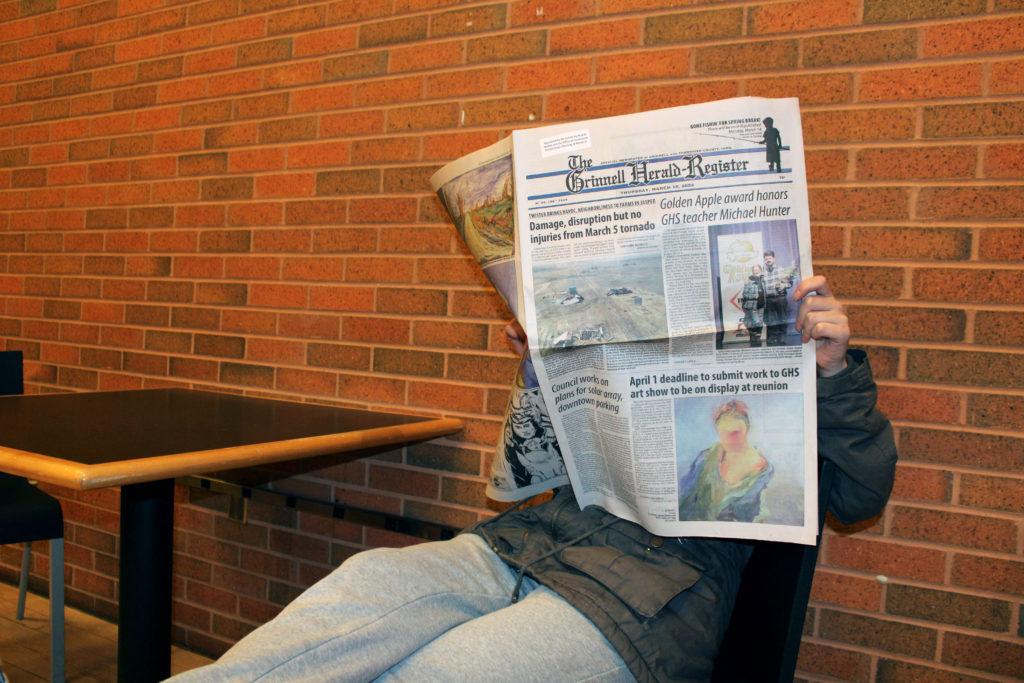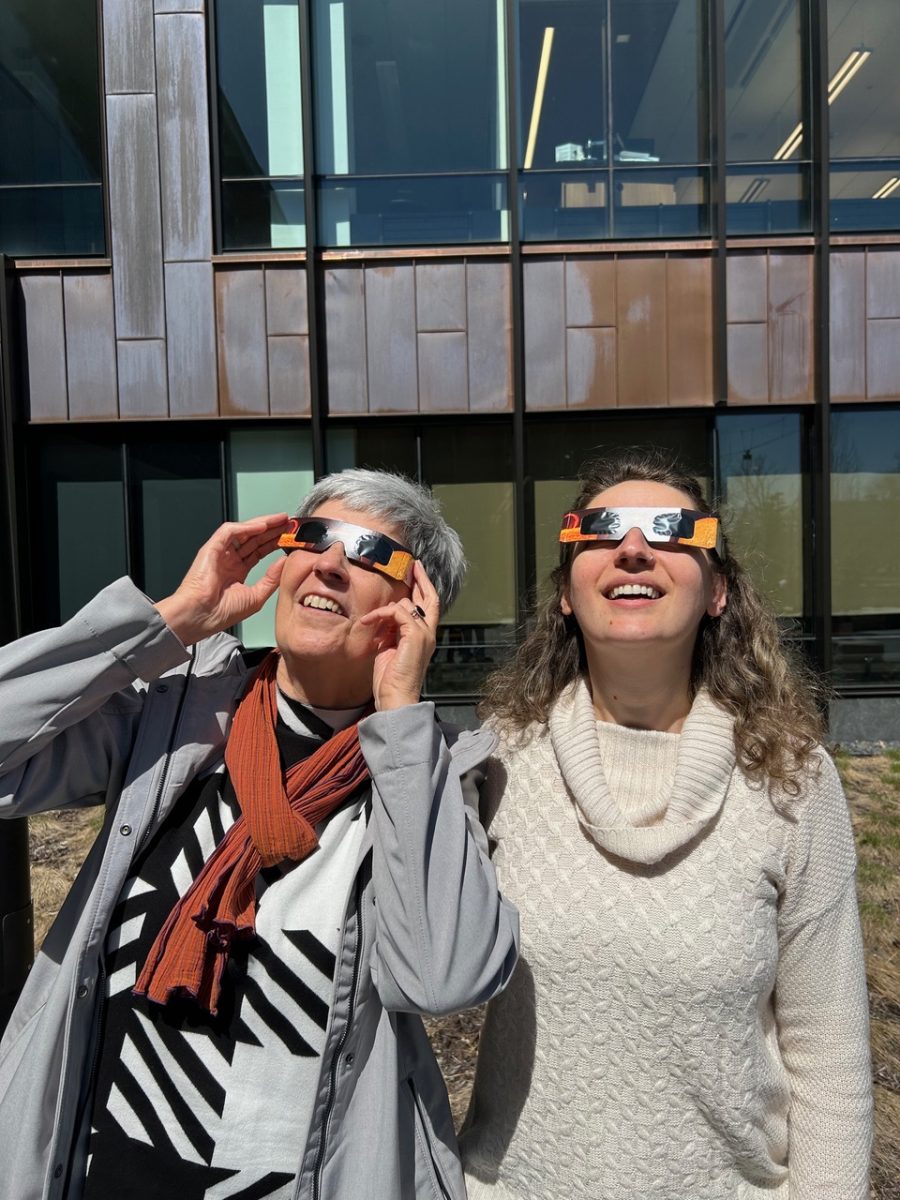By Allison Moore
mooreall2@grinnell.edu
The other night I found myself at Kum & Go at 11 p.m., as many Grinnellians do. As I sat in my car waiting for my friend to get some late-night donuts, I watched a silver minivan pull up beside me. A disheveled-looking man got out of the car, not the soccer mom picking up cigarettes that I expected to see. The man walked inside and deposited around 15 copies of a printed newspaper, bought something at the counter and left in his hot ride.
This may have happened just a few days ago, but this encounter with a delivery driver carrying physical newspapers into a local gas station could easily have been a snapshot from several decades ago. These days, more and more of us consume our news online. Is there any future for newspapers who still only use actual paper?
Every Monday and Thursday, the Grinnell Herald Register (GHR) prints and distributes their paper. Copies can be found sitting in tucked-away shelves at the Spencer Grill. I would venture to say that I am one of three people who regularly picks these up. But why? Why don’t Grinnell students read more about the community in which we reside?
Peggy Kinder Elliott currently serves as the managing editor of the GHR. As she told me in a phone interview, she is the third generation in her family to work at the paper. Her grandfather founded the paper in 1936 and it has been inherited by the family ever since.
Elliott said the GHR’s mission is “a commitment to provide to the community. The news that only a newspaper can really provide,” she said. To Elliott, the paper is “a key pillar in how Grinnell works.”
Elliott emphasized the importance of local papers in their coverage of local events. Big corporate papers don’t cover local sports games, newly hired teachers or births and deaths in a community, she said.
Today, the GHR only has about four people on staff, with a few others to help with distribution. They operate a tight schedule, always looking ahead to produce a full newspaper twice a week. But in a town of around 9,000 people, Elliott said that the paper’s circulation is estimated to be 2,200, with yearly subscriptions at a price of $44.50 for Poweshiek County residents.
To me, those numbers are abysmal, but they are not surprising. The number of independently owned local newspapers has been steadily decreasing for many years. So in an age where most people get their news online, whether at the New York Times, Fox News or Facebook, is it even worth preserving these dinosaurs of a bygone age? In short, the answer is yes, but not without qualification.
The Rosenfield Program recently screened “Storm Lake,” a documentary about Pulitzer Prize-winning journalist Art Cullen. For someone like me who has fallen in love with working in a newsroom, this raw, authentic, sometimes harrowing portrait of a struggling local paper was transformative.
Afterward, I was lucky enough to meet and speak briefly with Art Cullen himself. A tall and lanky man sporting what other news outlets have fondly described as a “mop of white hair,” a line of eager students soon formed behind him. I finally got the chance to ask my question: as an employee of the college newspaper, how can we strengthen our connection to the local paper and potentially help them reach a wider audience?
I will never forget what Cullen did next. He leaned in close, a mere three inches away from my nose. Then he simply said: “Help them get online.”
This answer is simple in theory, but difficult in practice. When I asked Elliott why the GHR did not have an online presence, her answer saddened me. “What we would dearly love to do is have a website but then here’s an interesting question: what to put on it. Right?”
She seemed skeptical about creating a news website. For her, social media, though popular, is really “a higher speed, broader version of gossip” that doesn’t conform to usual journalistic standards. It is no surprise, then, that the GHR’s Facebook page hasn’t been updated in two years. In the day-to-day grind of churning out a twice-weekly paper, the pressures of deadlines make it difficult to envision a broader strategy.
I will never forget what Cullen did next. He leaned in close, a mere three inches away from my nose. Then he simply said: “Help them get online.”
So what can be done? Currently, around 65 million Americans live in “news deserts,” which, according to the Hussman School of Journalism and media, are areas with “limited access to the sort of credible and comprehensive news and information that feeds democracy at the grassroots level.” Local papers could, with the right changes and support, help make up for this.
The S&B’s Professional Advisor Lyle Muller, former Executive Director of the Iowa Center for Public Affairs Journalism, also affirmed the importance of local journalism.
“No one else is going to report that local news for you,” he said. Supporting smaller newspapers is critical because “the coverage is necessary. Otherwise, there’s darkness.” After years in both broadcast and print journalism, Muller insists that whether or not newspapers in their current form survive, what’s most important is preserving journalism as a discipline.
This resonates deeply with me. Since I started working for the S&B, I, too, have become entranced by newspapers. There is something special about working six hours every Thursday night and then seeing the physical results of my work in Monday’s print edition. That is a feeling of accomplishment unparalleled elsewhere in my academic or personal life.
Nevertheless, there is a reason that we also have a website to publish our stories. Our college newspaper simply should not be the only online source of news in Poweshiek County. Local newspapers have other pressures outside of their control, but they need to learn to adjust more effectively to our current digital age. Only by doing so will they attract the kind of financial and political support needed to survive.
Since I started working for the S&B, I, too, have become entranced by newspapers. There is something special about working six hours every Thursday night and then seeing the physical results of my work in Monday’s print edition.
Muller is hopeful still. “I do think strong local relationships with people who care and are willing to put money into it, whether they be an advertiser or donor, I think that’s really helpful for small local news organizations,” he said. At the same time, he urged that “people have to adjust their thinking and realize that there’s a cost to producing good local news.”
While aspiring journalists like me fantasize about a gig at the Times or the Post, it is more likely most of us will end up working for more local news sources. I just hope that we can all do our part to make sure there are still enough places left who perform this important work. The further corporatization of journalism will only serve to weaken our democracy at a time when we most need reliable, diverse sources of information. We’re already used to helping our elders adjust to a fully digital world – it’s in our own self-interest to help local journalists do the same.
For more information, read Community Editor Nina Baker’s article “As local journalism declines, the Grinnell Herald-Register plows on”.
(Editor’s Note: Lyle Muller is the professional advisor to the S&B. He was not involved in the writing or editing of this article.)

























































